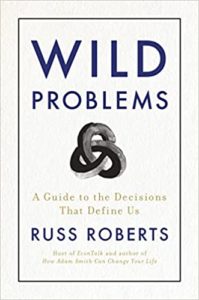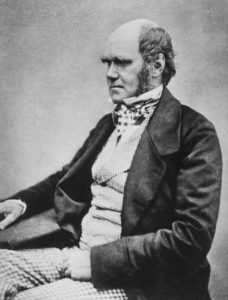“What was once destiny is now a decision.”
— Russ Roberts
Russ Roberts on Lessons from F.A. Hayek and Nassim Taleb, Decision-Making Insights from Charles Darwin, The Dangers of Scientism, Wild Problems in Life and the Decisions That Define Us, Learnings from the Talmud, The Role of Prayer, and The Journey to Transcendence

Russ Roberts switches roles, appearing as a guest on the Tim Ferriss Show to answer questions about his new book, Wild Problems in Life and the Decisions that Define Us. Longtime fans of EconTalk, Conversations for the Curious, (Roberts’ acclaimed podcast) have listened to this book idea evolve as Roberts has wrestled with aspects of the project through many conversations with influential guests.
Tim Ferriss takes the discussion beyond the eagerly awaited book where both authors do what they are deeply admired for: making complicated ideas understandable. A uniting theme of this journey of ideas is exploring how we might pay better attention to our journey so that we might celebrate our life as one well-lived. Please share your insights with us; we love to hear from you.
1- Early in the discussion, Tim Ferriss admits little familiarity with F.A. Hayek. How does Roberts’ explanation of the profound message in Hayk’s Nobel address, “The Pretence of Knowledge“ and the “The curious task….” quotation from The Fatal Conceit illuminate how the lesser known Hayek beat the famous John Maynard Keynes in the battle of the marketplace of ideas?
2- In what ways (other than the Amazon book recommendation example) is the Internet superior to human interaction at sorting and predicting? Do you believe it is possible that AI might shape our future choices about some of life’s wilder problems? Why or why not?

3- Darwin marries. Was his “Q.E.D.”, added at the end of his cost/benefit list, facetious? What other techniques outlined by Roberts might Darwin have employed to reach his “irrational” outcome?
4- To what extent do you agree or disagree with Roberts’ borrowed claim, “Until you’re married, you’re an idiot”? How about his strong belief in the superior nature of the marriage covenant to a contractual agreement or the choice to remain single? Do these ideas offer insight into declining marriage rates in the younger generations? Explain.
5- Roberts shares several things that give his life texture, such as music appreciation, religious practice, and marriage, to name a few. In considering your own list, how does it help you answer the question, “What is a life well-lived”?


Comments are closed.